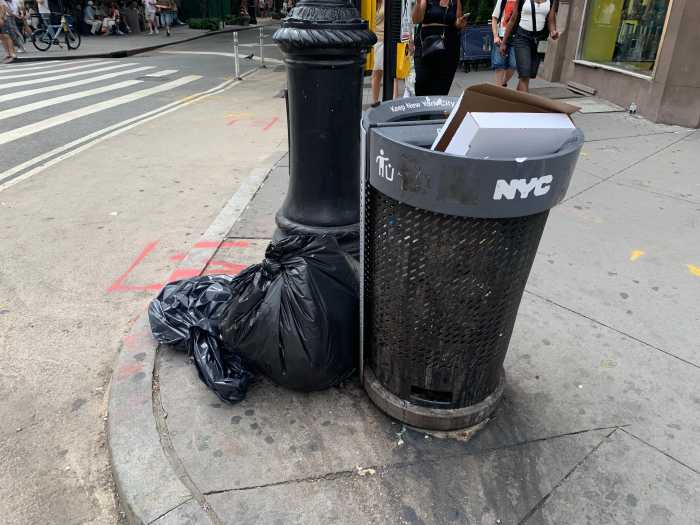By Rashed Mian and Christopher Twarowski
Disgraced ex-Suffolk County Police Chief James Burke pleaded guilty to federal civil rights violations and conspiracy charges Friday for beating a suspect and ordering police to cover it up.
Burke was arrested in December 2015 on allegations by federal prosecutors that he had beaten Smithtown resident Christopher Loeb while in police custody two years earlier and coerced police officials who had witnessed the beating to lie to investigators about what they’d seen.
Appearing clean shaven, without his trademark mustache, in a dull green prison jumpsuit, Burke told U.S. District Court Judge Leonard Wexler in Federal District Court in Central Islip that he “willfully used force and slapped and hit the individual” causing bodily harm.
“I plead guilty, your honor,” an emotionless Burke said before a packed courtroom.
Government prosecutors said Friday had Burke’s case gone to trial it would have included 11 officers who would testify to the beating, with several also testifying to the cover up. Prosecutors also stated they are seeking 51 months of prison for Burke, who has no right to appeal that length unless Wexler approves additional time for the former police chief.
Burke, who had originally denied the charges, had been held without bail since his arrest, with Wexler deeming him a danger to the community.
Robert Capers, US Attorney for the Eastern District of New York, in a statement, chided Burke for violating “his oath and responsibilities as a law enforcement officer by exacting personal vengeance, assaulting a handcuffed suspect, and abusing his authority.”
Federal investigators had long since alleged that Burke had assaulted and threatened to kill then-24-year-old Loeb while in police custody at the Fourth Precinct station house on Dec. 12, 2012. Loeb had stolen a duffel bag from Burke’s SUV that contained sex toys, pornography, Burke’s gun and ammunition belt, among other items.
Investigators had also alleged Burke forced police present during the beating to lie to federal investigators.
While Loeb was shackled in an interrogation room, Burke punched and kicked him, grabbing him by the ears, shaking him and declaring: “You want to steal from me?” according to court documents. He also threatened to give Loeb, a heroin addict, a “hot shot”—slang for a lethal overdose of the drug.
Prosecutor James Miskiewicz said in December Burke’s porn was his “motivation for beating the hell out of Loeb.”
Burke had retired in October amid reports of a federal investigation into the incident, enjoying an annual salary of more than $230,000 until then, along with a retirement payout of more than $430,000.
Outside the courthouse, Loeb’s attorney Bruce Barket, who is representing him in a civil case regarding the assault, told reporters his client “feels vindicated by this,” explaining that Loeb “was treated with scorn for a number of years.”
Burke’s admission “essentially proves our case,” he added.
Also after the proceeding, one of Burke’s attorneys, Nancy Bartling, read a letter from Burke that says his guilty plea “reflects his deep desire to accept responsibility for his actions.”
“[Burke] acknowledges his lack of judgement and failure in leadership,” she continued. “Under no circumstances will Mr. Burke be cooperating with the U.S. Attorney’s Office [or] the Suffolk County Police Department in any way.”
“It’s a sad day for him, it’s a tough day for him,” added Burke’s other attorney, Joseph Conway, also suggesting that other officers involved in the conspiracy have either pleaded guilty or will do so soon.
Nellin McIntosh, spokeswoman for the US Attorney’s Office for the Eastern District of New York, said she had no comment when asked about Conway’s statement.
However, Capers, the US Attorney, said the investigation is ongoing, adding “we will seek to hold accountable anyone who violates another’s civil rights or attempts to obstruct justice.”
Following Burke’s indictment in December, Capers left open the possibility of further arrests.
“Stay tuned,” he told reporters.
Suspicious Legacy
Burke was just 14 years old when he took the stand as a witness for then-prosecutor, current Suffolk County District Attorney Thomas Spota in one of the county’s most heinous and well-publicized crimes—the murder of 13-year-old John Pius, Jr., of Smithtown, whose lifeless body was discovered beaten and suffocated with rocks stuffed down his throat.
Burke’s testimony helped convict four local teenagers for the slaying; one was later overturned.
Following in the footsteps of his father and grandfather, Burke spent a year as a New York City police officer in 1985 before joining the Suffolk County Police in 1986 at 21, first as a patrolman in North Amityville and later as an undercover narcotics officer. He later spent a decade in the Suffolk district attorney’s office as chief investigator under Spota.
Despite his meteoric ascent up the Suffolk County Police Department’s ladder, however—capped with his appointment as police chief in 2012 by Suffolk County Executive Steve Bellone—Burke has never been a stranger to controversy.
The 30-year SCPD veteran was the subject of an Internal Affairs investigation in 1995 that concluded allegations he “engaged in a personal, sexual relationship” with “a convicted felon known to be actively engaged in criminal conduct including the possession and sale of illegal drugs, prostitution and larceny,” “engaged in sexual acts in police vehicles while on duty and in uniform,” and “failed to safeguard his service weapon and other departmental property” were “substantiated,” according to its report, first obtained by Newsday.
Burke also came under fire in 2012, the same year as his crowning as police chief by Bellone, for his perplexing disbandment of the highly successful Suffolk County Police Department component of the FBI’s joint Long Island Gang Task Force—its dissolution the subject of a Press cover story “Turf War: Is SCPD Playing Politics By Leaving FBI’s LI Gang Task Force?”
Yet instead of discipline, Burke repeatedly received promotions, with Bellone and Spota facilitating his rise through the ranks.




































